“This community future hinge on three things – water, light and roads,” says Vanessa O’Donoghue, a resident of the small community of Barnwell on the East Bank of Demerara. O’Donoghue is one of several residents of the community of approximately 700 persons who settled in the area more than two decades ago. Barnwell is located approximately two-and-a-half miles from the EBD public road and is not far from Mocha-Arcadia.
O’Donoghue, who is regarded as one of the community’s ‘organisers,’ explained that Barnwell is divided into two sections as specified by the Ministry of Housing and Water land allocation department – Barnwell North and the New Prosperity housing area. The former was once a squatting area but is in the process of being regularized. She said that the settlement was initially a farming area, and that when Mocha Arcadia was established years ago, Barnwell was set aside for farmers from that community to plant their crops. As time progressed, however, persons eventually moved into the area to live, and eventually the population grew to what it is today.
The community organizer, who has lived at Barnwell for the past 20 years, noted that at the moment there are more than 40 plots of leased land allocated to residents. With the passage of time, and as the population increased, she said, persons approached the authorities numerous times to have the area regularized.
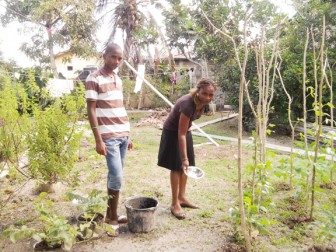
“This area has been without electricity, proper water and roads, and to know that we have a population of mainly working class people, many of whom have children, it‘s our hope that it would change in the near future,“ O’Donoghue said.
Farmer Jermaine Morrison told Stabroek News that he has lived in Barnwell for more than 20 years and he has seen the community grow over time. As a farmer, he said, he has had a difficult life but that his profession gives him an opportunity to contribute to Barnwell’s development. “As a young man growing up in this area I went through plenty, but what we want here is better roads, electricity and water, proper supply that is,“ Morrison said, an aspiration which was echoed by everyone who spoke to this newspaper.

As one walks around the community, it is evident that a few persons are working to market their respective small businesses. One such resident is Miranda Lord, a single mother of two. Lord told this newspaper that she once lived in south Georgetown, but moved to Barnwell to live closer to her mother. She said that she grew up in Barnwell but moved to the city as a teenager.
Lord told Sunday Stabroek that she has been involved in the field of cosmetology since the mid-1990s and since moving into Barnwell a decade ago her customers have faced difficulty accessing her services. “I use to work from home in town, and after I qualify myself in the field I move here, but it hard because many of my customers would have difficulty getting into this area; the main problem is the road.“ She said that she nevertheless went ahead and established her business which has “a few up and down days.“
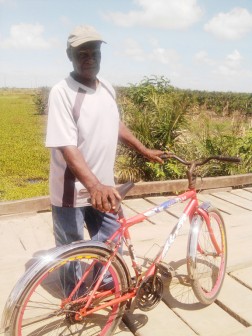
“This place got plenty people,” she continued; “many of them are working people and a characteristic about it is that every night you have to hear generators running, most times into morning.“
While many are out of the community working on the East Bank during the day, seamstress Nicole Glen, a 42-year old single mother of two, sits behind her sewing machine and “sew the community clothes….year in year out.“ She said that she has been living in Barnwell for more than 12 years and that the village would always be her home since “everybody here is like a family, so if something is to happen to anyone, is the whole community will come out.“ She once lived in Agricola, she said, and has been sewing clothes since her early teens.
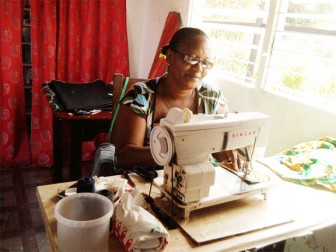
Barnwell was a canefield at one time, an elderly resident of the nearby community of Mocha Arcadia, Victor Simon, noted. When this newspaper caught up with the “old man,” as he is called by his friends, he was cycling along the main bridge which leads to the community, on his way to a nearby hang-out spot.
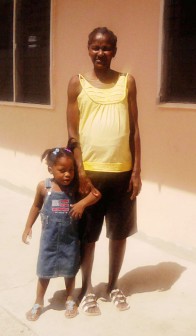
Simon said that he has a certain “connection“ to Barnwell since he travels to the roadside shops there to relax and spend time with his friends almost every day. Like O’Donoghue he too said that in the in the mid-1980s the previous administration transformed the parcel of land aback of Mocha-Arcadia for farming purposes. Many persons established cash-crop farms on the former canefield, adding that they saw the move as one with great prospects for development. “This area here use to be a small farming area and all you use to have is the main dam heading east aback Barnwell North,“ Simon recalled. He said that the area was thriving up until the 1990s when many chose to live in the area, and “maybe farming started to become thing of the past.“
Heading south into Barnwell, this newspaper encountered Victoria Liverpool, an elderly resident of the village who said that she longs for the day when it is recognized “as a community.“ She said that many relocated from the area over the years citing the present difficult circumstances. However, Liverpool noted that “housing was in here and they made a few promises but that is all we been getting in the past couple years.“ She went on to say that a few years ago, the Ministry of Housing and Water placed standpipes in various parts of the village, “but that is not as easy as they try to make it look, since me and my family still have to fetch water for close to a half mile to our home.“
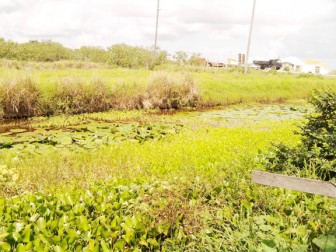
In addition to the absence of electricity, roads and potable water, residents noted that there are no recreational activities which the community can engage in, and that residents have to venture over into Mocha Arcadia in order “get involve in some meaningful activity.“ There is also no health centre or health post and residents noted that this is worrisome. “[One time] an elderly man tek in,” O’Donoghue said, “but because of transportation woes, mainly taxi-drivers not wanting to come in here, the man died some time after.“
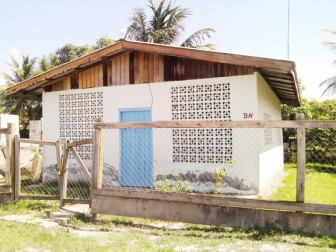
There are also no schools, and the children go to school either in Mocha-Arcadia, or on the East Bank. There are, however, two churches.
There are some small roadside shops selling drinks and confectionery, but little else in the way of commercial activity. The roads, which are unpaved, are maintained by residents through self-help efforts. Despite this, they are difficult to traverse in the rainy season.
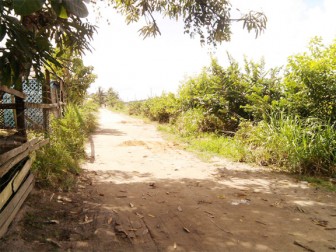
But while the problems may appear to outweigh the positives at the moment in Barnwell, residents believe that the area will develop, since many persons have resiliently built their livelihoods in the small community. According to Lord, “one hand can’t clap; but I know that in time Barnwell will develop to what many of us dream it should be.“




